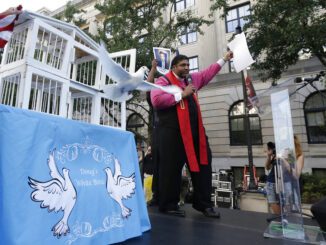CHARLOTTE — It may be an off-year, but election season in Mecklenburg County is ramping up. And while Charlotte Mayor Jennifer Roberts faces challengers in the Democratic primary, conservatives have set their sights on flipping the Queen City from blue to red.
The last Republican mayor of Charlotte was in 2009, with Pat McCrory winning voters seven times in a row and earning him the title of longest-serving mayor in city history. The GOP has lost five consecutive races since.
In a city where registered Democrats double Republicans, the question remains: can the GOP win in Charlotte?
Kenny Smith, a current city council member and the most financially established Republican candidate in the race, said that is the first question he gets when courting voters and donors.
“People look at what happened last fall and the fact that we haven’t won in several cycles and say a Republican can’t win,” said Smith. “The demographics have not shifted extraordinarily since McCrory left office, maybe a little bit around the margins,”
“The answer is yes,” he says with determination.
Insiders say it is possible — especially when low turnout means that residents that do vote will have more clout.
In 2015, only 8.7 percent of more than a half a million Charlotte voters cast ballots in the general election. Roberts won with 52.2 percent of that vote, but only 3,700 votes ahead of Republican Edwin Peacock.
Voters seemingly lacked motivation to get to the polls last cycle, with 16,476 less votes cast compared to 2013.
“[Peacock] dropped 7,000 votes between the cycles,” said Smith. “So if his turnout had simply stayed where it was, he wins by about 3,000 votes.”
Smith thinks he can shift those numbers in his favor, especially as Roberts’ controversial first term — centered around a nondiscrimination ordinance, sanctuary city status, and violent racial protests uptown — may drive moderates and conservatives to the polls on Nov. 7.
Larry Shaheen, founder of the Charlotte-based Carolina Political Consulting firm that has managed several successful Republican campaigns within Mecklenburg County, said Smith could win.
“Kenny can and mostly will have the best opportunity to take the mayor’s office in Charlotte since 2009,” he said. “You’re likely going to see the demographics shift to the voting base that is more enthusiastic.”
Furthermore, Roberts has competition from her own party.
“You have two very serious Democratic challengers,” said Shaheen. “That evidence says there is significant dissatisfaction with the current mayor.”
Roberts faces four challengers, including her second-in-command, Mayor Pro Tem Vi Lyles, and state Sen. Joel Ford, who represents west Charlotte. A runoff would spell extra time for Republicans and could benefit them.
“If they spend a month and a half beating up on each other, Kenny will be able to cruise through his primary, relatively unscathed, not having to spend too much, and will be locked and ready to run a very significant campaign,” said Shaheen.
Both primaries are scheduled for Sept. 12. Smith will face perennial candidate Gary Mitchell Dunn and former N.C. Magistrate Kimberley Paige Barnette.
And while Smith may sail through the Republican primary, he is seeing a bit of competition in his statewide donor base from Ford.
Ford has received campaign contributions from top GOP lawmakers, including state Sens. John Alexander (R-Wake), Bill Rabon (R-Brunswick), Jerry Tillman (R-Randolph), Tommy Tucker (R-Union), and House Rules Chairman David Lewis (R-Harnett).
Conservative support for Ford may be attributed to his willingness to come across the aisle on important votes — he supported magistrate recusal for civil ceremonies and the Duke Energy coal ash cleanup bill, to name a few — or simply colleague camaraderie.
Ford calls his “key support” from members in the state House and Senate “a mutual respect for who I am as a legislator and who I am as a leader.”
But with $307,800 cash on hand, Smith has a leg up on Ford ($95,500), Lyles ($103,500) and even Roberts, who has saved $230,000 after fundraisers last month in Los Angeles and Texas.
Jane Whitley, chair of Mecklenburg County Democrat Party, said the local and state party committees are ready to deploy resources after the voters pick their nominee next month.
“I think our candidates each have their own vision of what they want Charlotte to be,” said Whitely, who added the local party will not wade in to support their incumbent. “It’s up to the voters to decide.”
Dallas Woodhouse, executive director of the North Carolina Republican Party, said that while elected officials like those donating to Ford are welcome to make personal donations, the N.C. GOP is ready to dedicate “significant” support to the Republican candidate after the primary.
“We certainly have an opportunity there if the election is a referendum on Democrat leadership of the city which has been very chaotic,” said Woodhouse. “I think that referendum happens no matter who comes out of the Democratic primary.”
For Smith, reminding voters of the controversies and divisive politics that have surrounded the city in the last 18 months is key to motivating a change election.
“I think there are a lot of people out there that are tired of the chaos, tired of the in-fighting, tired of the national issues brought here,” said Smith. “Charlotte deserves better.”



